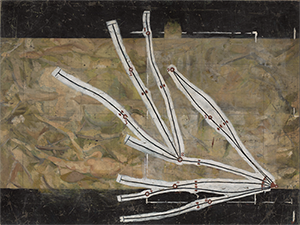2022

"Contingency & Necessity"
At a time when the unexpected, uncertainty and contingency have shaken societies and the certainties of modernity based on science and technology, to think about contingency - what happens, chance - and its opposite, necessity - what cannot be otherwise than it is - is to think about the possibility of something happening, not happening, or happening in another way. The open field can go from the confrontation between the unpredictable and the providential (between "contingent futures" and providentialism), or between chance and necessity (from Jacques Monod's evolutionary biology), to indeterminism ("Heisenberg's uncertainty principle") and order (or constant and predictable), applying to the biological and to life, to the philosophical, the social, the political, the historical, or to narratology.
In order to banish the contingent, natural or historical causality is introduced, which arises from probability as if the real were ordered, but also the permanent monitoring and surveillance of the real. Or one advocates, on the contrary, that "the only thing necessary is that everything is contingent, even the laws of nature", in the words of Quentin Meillassoux, or that "only chance saves", as Georges Bataille states. What is certain is that the contingent erupts again and again, for the greater the control, the more the contingent emerges in its most brutal forms - that of the accident, the catastrophe - or the lightest - that of the failure or breakdown. The play of contingency and its control is one of the characteristic features of modernity.
.8th February
Alexandre Quintanilha - Knowledge - Pilar of Democracy
